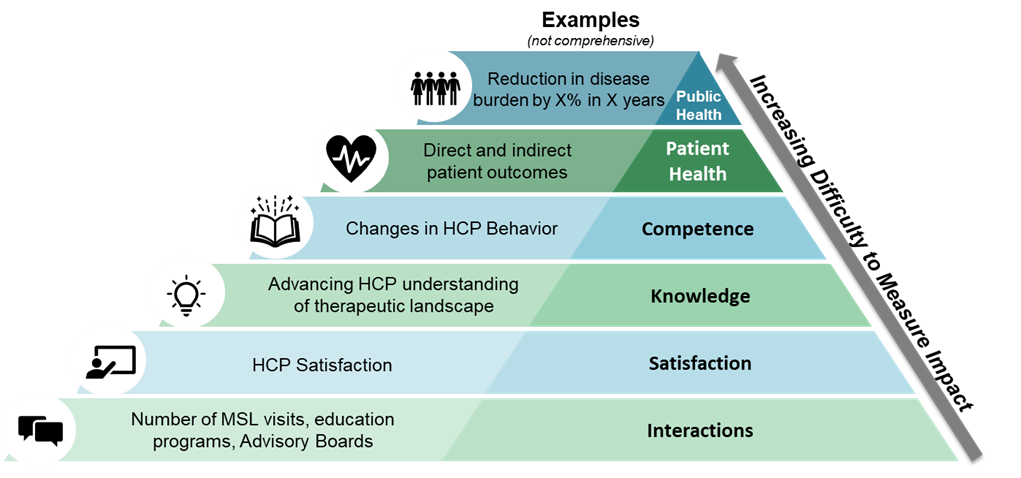From action to impact to patient value: Highlights from the MAPS 2024 EMEA Annual Meeting (Madrid)
Setting the scene
The key Medical Affairs meeting in the EMEA region – the MAPS (Medical Affairs Professional Society) 2024 EMEA Annual Meeting took place this year from 12-14 May in Madrid. Over 400 Medical Affairs professionals from healthcare companies, patient advocacy groups, specialized consultancies and public institutions came together for 3 days to share best practices, discuss future trends in the dynamic healthcare landscape, and to jointly refine the core capabilities needed in the Medical Affairs function of the future in global and local teams. The rapidly growing number of conference attendees reflects the increasing importance and recognition of Medical Affairs.
From action to impact
This year, the conference theme was “From Action to Impact” to shift the attention to the actual value Medical Affairs can generate in their critical role to bridge the gap between science and clinical practice, and to improve the care for patients. Put in practice, moving from action to impact means to “start with the end in mind”: Medical Affairs first defines the desired impact and outcomes based on their strategic imperatives and only thereafter the corresponding tactics – not the other way around.
A best practice for Medical Affairs in doing that is to co-create the desired impact together with external stakeholders (e.g., HCPs and patients) who can help contextualize what is considered to be meaningful impact. Priority is given to outcomes that are both meaningful for stakeholders and at the same time realistically achievable with the available resources. Ideally, Medical Affairs activities impact the behavior, knowledge, and/or beliefs of healthcare stakeholders to drive better patient outcomes.
“What gets measured gets done”
A key element in shifting the attention from action towards the impact and value of Medical Affairs is the systematic assessment of their impact. Quantifying the impact of Medical Affairs initiatives is essential to optimize strategies, improve execution of tactics, and demonstrate value within the healthcare space. However, despite the importance of quantifying impact, there are challenges associated with how impact is measured.
It has been widely recognized that there is a lack of standardized metrics and benchmarks for measuring the impact of Medical Affairs globally. For example, a recent 2023 MAPS Metrics Benchmark survey identified that 70% of respondents (including representatives from pharma, biotech, medical devices/diagnostic companies) did not have methodology in place to analyze the relationship between Medical Affairs activities and their overall outcomes. This suggests Medical Affairs may not be capturing their full value and impact. Furthermore, having a streamlined methodology in place to systematically assess the relationship between activities and outcomes may also identify opportunities for improvement, fuel performance, and drive Medical Affairs’ growth within the organization.
Best practices in quantifying the impact and value of Medical Affairs
While demonstrating the impact and value of Medical Affairs poses an inherent challenge, it is worth the effort to tackle this challenge for any Medical Affairs function. Although each use case and each Medical Affairs organization is unique (and therefore require a customized measurement approach), well-defined best practices exist. These best practices can guide the successful development and implementation of meaningful metrics in practice.
- While measurement objectives should be clearly defined, a single metric may not sufficiently quantify Medical Affairs impact. Strategically combining metrics that span across Medical Affairs’ activities, impact, and outcomes may optimize capturing impact holistically. At the same time, utilizing too many metrics could result in “metric overwhelm” and an optimal balance should be considered
- Metrics should be “fit for purpose” – their suitability depends on the therapeutic area, asset lifecycle, and organizational maturity – and ultimately link back to the strategic imperatives and implemented tactics
- During the design phase of the measurement strategy, the data availability, data analytics approach, real-life implementation, and budget constraints should be considered
- Dynamic medical dashboards are an impactful tool to track metrics with strategic goals, to drive socialization of strategies and outcomes, and to enable follow-up actions (e.g., insights-to-action)
Take home message
The importance and recognition of Medical Affairs as a strategic partner for both internal and external stakeholders has significantly evolved over the past years and will continue to do so. To be able to demonstrate the value of Medical Affairs, systematically measuring impact is imperative. While more difficult to measure, selecting metrics that measure changes in knowledge, competence, and patient outcomes have the most utility in demonstrating the true value of Medical Affairs. (see Figure 1).
Figure 1: Illustrative Hierarchy of Medical Affairs Metrics
References:
- Medical Affairs Metrics Benchmark. Medical Affairs Professional Society, 2023.
- Mastering the Art of Leveraging Meaningful Metrics. Medical Affairs Professional Society Whitepaper, 2022.
- How to Measure the Impact of Medical Affairs to the Organization. Medical Affairs Professional Society, 2021.

Jump to a slide with the slide dots.
 Rudiger Papsch
Rudiger Papsch
MAPS EMEA 2025: Driving Transformation and Excellence in Medical Affairs
Explore how MAPS EMEA 2025 redefined Medical Affairs - patient-centricity, AI, evidence generation & launch excellence take center stage
Read more Jo Ann Saitta
Jo Ann Saitta
Why AI Needs Humans: The Critical Thinking Advantage in Pharmaceutical Commercialization
AI speeds pharma insights, but human experts turn them into action. ClarityNav blends AI power with strategic, real-world expertise.
Read more Radosław Skowron
Radosław Skowron
Acceptance of Artificial Intelligence in Evidence and Dossier Developments by HTA bodies: Challenges and Opportunities
AI is transforming Health Technology Assessment, but trust, transparency, and clear HTA guidance are key to broader acceptance.
Read more

